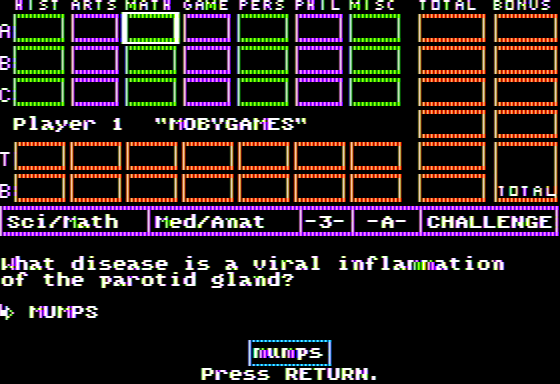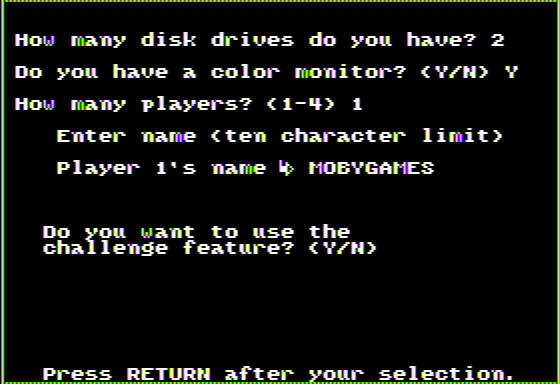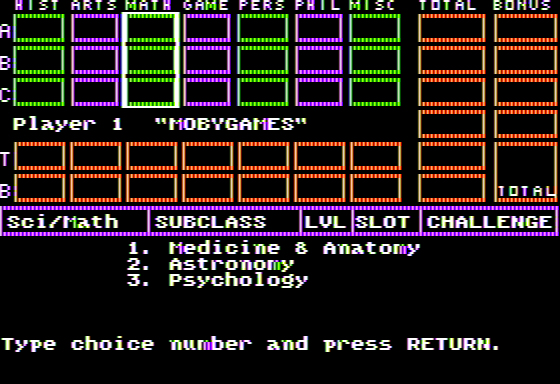
Database
 1st April 1985
1st April 1985
Categories: Review: Software
Author: Cliff McKnight
Publisher: Quest
Machine: Apple II
Published in Apple User Volume 5 Number 4
La Triviata
I don't care if it is only April, my award for the game title of the year goes to La Triviata from Quest Learning Systems. Unless you're an opera fan without a sense of humour, you've probably realised just from the title that the game follows in the great trivia tradition. Mind you, I haven't been asked the famous Nancy Reagan question yet.
La Triviata allows from one to four players and offers a bit more than a simple "points for right answers" scheme. There's also a strategy element by which you can increase your points.
As you can see from the screen dump, each player's scoreboard is divided into 21 cells - seven question categories by three rows. Each player's turn starts with the program randomly selecting a question category or giving you the choice. If it picks a category which you've filled already, play passes to the next player.

Within the chosen category, the program then either gives you a choice of three randomly selected sub-categories or selects a sub-category without option. You must then decide what level of difficulty you would like the question to be, and in which of the category cells you will put the points. There are three levels of difficulty, with points being directly related to difficulty. A wrong answer causes a zero to be entered in the chosen cell.
Bonus points are awarded if the marginal totals exceed a particular value. In practice this means that for a bonus to be awarded you must average Level Two answers. While this may be easy to do within one topic, it's obviously a lot more difficult to achieve over all seven topic areas.
Since you must choose where your points will be put before the question is posed, your confidence in producing the right answer becomes crucial.

My strategy, for example, was to leave Row A free for answers to categories in which I was confident of producing a correct answer.
The possible drawback is that each time a topic comes up, you may be forced to answer a question in a sub-category about which you know nothing - not difficult in my case. So much for strategy.
Once a player gets a question wrong, play passes to the next player. The first player to fill their card gets a chance to change one of the scores and then the winner is announced. The game keeps a Hall of Fame, and high scores are saved to the disc along with the player's name.

One interesting feature of the game is the "challenge" option. When an answer is judged to be wrong, a rude noise is made and the player can challenge the decision. The correct answer is then given and the other players must decide if the challenging player's answer is acceptable.
An incorrect challenge is penalised by the entry of negative points on the scorecard, while a correct challenge is counted as usual.
The penalty has the effect of making you think before you challenge. A few times we were hopping mad because we didn't challenge a decision, only to find that our guess ought to have been acceptable. In these cases a retrospective challenge option would have been nice.

For example, it's a bit annoying to give the answer 5 and have it marked wrong, only to discover that the "correct" answer was +5. Similarly, Thomas A Becket was acceptable to us, but the program demanded Thomas Becket.
This latter example possibly betrays the major problem with the package - its American origins. The questions are distinctly biased towards the USA. Of course, much of the American way of life finds its way over here, so you may still be able to answer many of the questions.
Another drawback is that the program seems to access the questions in a similar order each time. It will remember which questions have been presented over several games within the same session, but rebooting will produce a similar order.

Of course the random element means that different categories will probably be chosen, so no two games will be identical. Even after lots of games we were occasionally surprised by being presented with a sub-category we hadn't seen before, and new questions continue to crop up even now.
The game comes with two question discs and apparently more are planned. It would be nice to have a localised question disc, but even without it we've had great fun. After a few more games I might even be able to *remember* who won the Superbowl in 1983.
If you haven't encountered trivia games and still don't know what one is, ask yourself this question: How many folds are there in the standard paper aeroplane?









